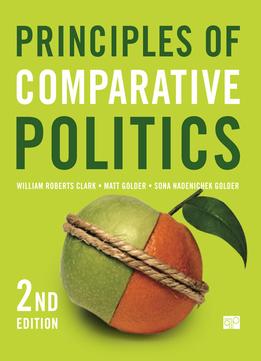
Principles Of Comparative Politics (2Nd Edition)
by Matthew R. Golder /
2012 / English / PDF
21.4 MB Download
The groundbreaking first edition of Principles of Comparative Politics offered the most comprehensive and up-to-date view of the rich world of comparative inquiry, research and scholarship. Now, this thoroughly revised second edition offers students an even better guide to cross-national comparison and why it matters. The new edition retains its focus on the enduring questions with which scholars grapple, the issues about which consensus has started to emerge, and the tools comparativists use to get at the complex problems in the field. Improving organization and integrating the latest scholarship, important changes include: A new "Varieties of Dictatorship" chapter, as well as clearer headings signaling coverage of authoritarian regimes elsewhere in the text; A delegation, or principal-agent, framework is introduced as a unifying framework for analyzing different types of democracy in the “Parliamentary, Presidential, and Semi-Presidential Democracies” chapter. A slightly modified classification scheme is also used for identifying these democracies. A significant reorganizations of the "What is Science?" chapter so that there is greater emphasis on the scientific method and less focus on the ins and outs of Mill’s methods; An expanded program of maps to allow students to visualize the geographic distribution of various key institutions around the world; New problems that help students to work through the theoretical, conceptual, and methodological material that is presented; Timely analysis of developments in the Middle East as part of the “Economic Determinants of Democracy and Dictatorship,” “Varieties of Dictatorships”, and "Democratic Transitions" chapters; Updates for current events, including coverage of late Bush and Obama era policies, conflict in Somalia, NATO intervention in Libya, and more. Beginning with a clear and straightforward discussion of the comparative and scientific methods, each chapter outlines the debates about the political phenomena that drive current research, such as state failure, the economic and cultural determinants of democracy, or the effects of regime type and electoral system. The authors show students how comparativists construct and test theories, applying the principles of the scientific method and simple game theory to a wide variety of examples and cases. Students won’t get lost in detail they’ll never use or remember and instead learn exactly why the variations across institutional structures and functions are important. The book’s outstanding pedagogy includes chapter opener overviews, bolded key terms and a marginal glossary, more than 250 tables and figures, numerous photos and maps, end of chapter problem sets, and new works cited and country-specific bibliographies.











